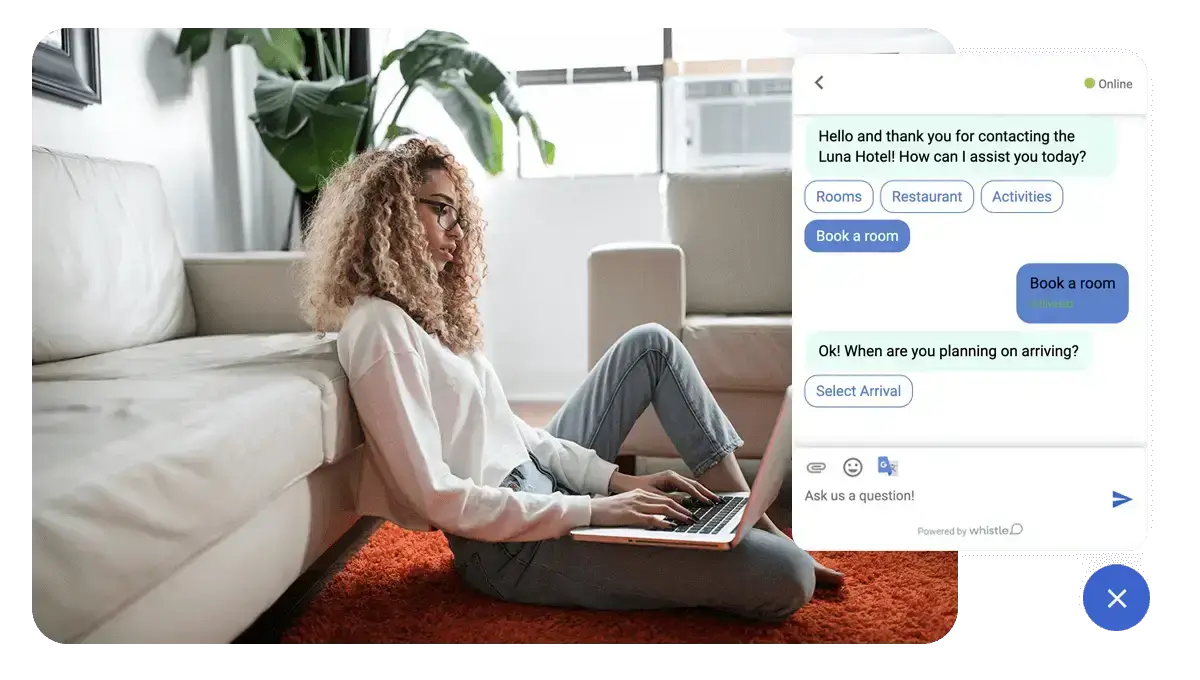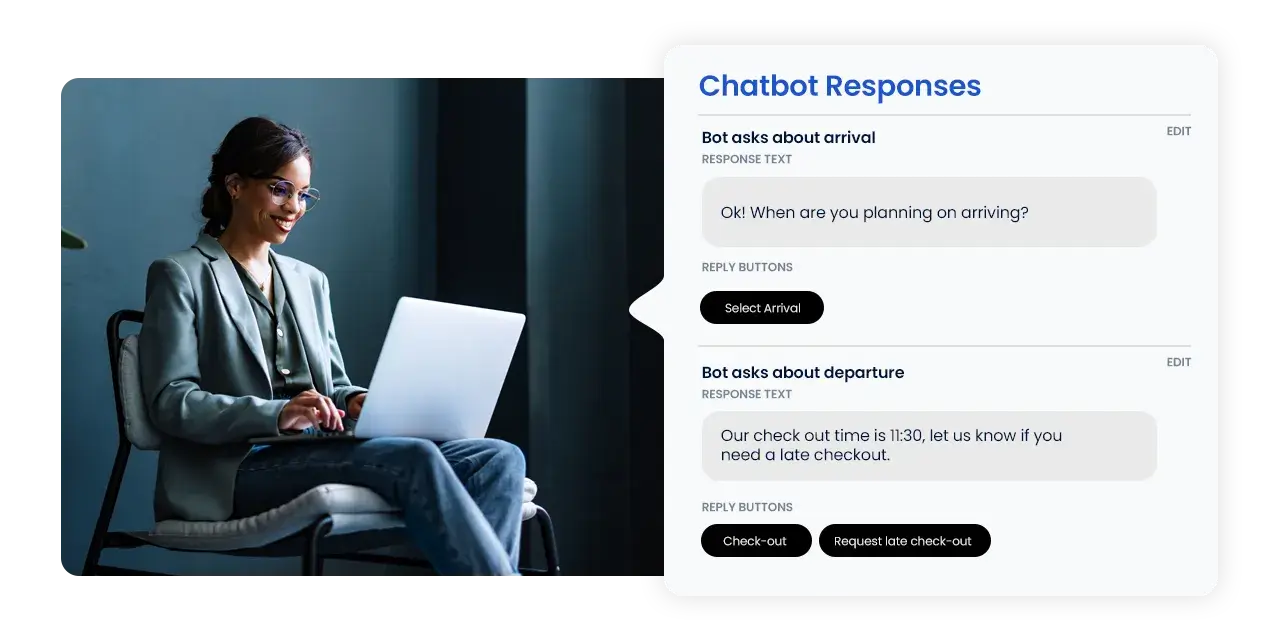
By Paula Carreirao
Fast and easy. This is how customers expect services today, including in the hotel industry. Instant gratification is a significant factor in travelers’ behavior when researching their next trip. They want to find the necessary information quickly to make an informed decision.
In a world that can not wait, hotel chatbots have become hoteliers’ best allies in providing excellent guest experiences while generating bookings and additional revenue. They are also a great resource to streamline processes and a valuable solution for the ever-going staffing crisis in the hospitality industry.
Despite the advantages of chatbot technology, many hoteliers still need to recognize their significance. This article will discuss why chatbots are crucial in the hospitality sector, the benefits of implementing this technology, and the essential features to consider when selecting a provider.
But first, watch Ricardo Diaz, Strategic Onboarding Consultant at Cloudbeds, showcase Whistle for Cloudbeds’ chatbot during Passport 2024.
What is a hotel chatbot?
A hotel chatbot is a type of software that mimics human conversations between properties and guests or potential guests on the hotel’s website, messaging apps, and social media. It serves as an automated chat or conversational interface.
Virtual assistants, digital assistants, virtual concierges, conversational bots, and AI chatbots are all different names for chatbots. Regardless of what you call them, hotel chatbots are here to stay. A January 2022 study that surveyed hoteliers worldwide identified that independent hotels increased their use of chatbots by 64% in recent years.
Companies use bots to take orders, offer product suggestions, provide customer support, schedule meetings, and do other specific jobs. In the hotel industry, a hotel chatbot can respond to customer queries, streamline the booking process and encourage guest engagement.
How do chatbots work?
The best and most advanced bots are powered by artificial intelligence, but many bots follow a set of rules programmed via a bot-building platform. An AI chatbot needs to understand the greater context of user questions. It should also be able to execute tasks about those questions and answers.
While some rule-based chatbots are built for more straightforward tasks, AI-powered chatbots are designed for intelligent and complex tasks. Chatbots use a technology known as Natural Language Processing (NLP) to understand what’s being asked and trigger the correct answer.
The hospitality chatbot’s main goal is to help travelers find solutions no matter where or what device they use. It provides the information they need to book confidently and directly with your property while allowing your hotel staff to create direct connections with them.
Hotel chatbots became a great tool to help hotel staff deal with their high workload and the repetitive questions they must reply to daily. These conversational bots also provide a scalable way to interact one-on-one with buyers, which can be especially handy in a labor shortage.
In this snippet from The Turndown podcast by Cloudbeds, Sebastien Leitner, VP of Partnerships at Cloudbeds, explain how chatbots can scale guest service by answering common questions in a few seconds.
Hotel chatbot examples
Chatbots are becoming increasingly popular in various industries and can be used for different purposes. Some chatbots provide information, such as the weather bot created by Poncho, while others, like the Slack bot developed by Paypal, are used for transactions.
The travel industry is ranked among the top 5 for chatbot applications, accounting for 16% of their use. Major brands in the travel industry, such as Expedia and Booking.com, have already integrated conversational AI chatbots into their operations to assist customers by processing bookings, recommending travel plans, and offering promotions.
Hotel chatbots have become incredibly popular as they can help hotel staff in different areas, such as front desk, housekeeping, and hotel management. From boosting direct bookings to decreasing agents’ work overload, a hotel chatbot can act as an efficient concierge or reservation agent, delivering five-star experiences to travelers.
9 benefits of chatbots in the hotel industry
Hotels benefit greatly from AI chatbots as they reduce costs and increase direct bookings by automating customer service and streamlining administrative tasks. This way, they increase customer satisfaction while lowering costs.
Furthermore, the personalized interactions provided by hospitality chatbots improve the guest experience and simplify the booking process, driving profitability while increasing guest satisfaction.
1. Direct booking boost
When potential guests visit a hotel website, they often have questions before booking. Adding a chatbot or live chat widget can make it easy for visitors to find the information they need and address their doubts in real-time.
By integrating a chatbot with the booking engine, properties can provide users with answers to availability and room type questions directly through the chatbot. The chatbot can guide travelers through booking, answer queries, and facilitate reservations seamlessly, leading to increased conversion rates, direct bookings, and upselling opportunities.
The image below shows how the automated live chat from Whistle for Cloudbeds can provide real-time booking assistance, which leads to increased conversion rates.

2. 24/7 availability
Usually, the availability of a service is determined by the opening hours of the customer service staff or call center. However, having chatbots on your website ensures every lead is attended to 24/7.
This approach results in real-time communication between website visitors and your business, building trust in your brand. Additionally, it allows you to cater to guests’ needs anytime, ensuring uninterrupted service even during peak seasons and holidays.
3. Fast service
In today’s fast-paced world, it’s essential to respond to messages promptly. Customers expect quick and immediate answers, and addressing their questions and concerns is necessary.
Using chatbots, you can assist multiple customers at once and quickly provide them with the information they need rather than making them wait. Additionally, it’s crucial to act when travelers have complaints or urgent demands, so chatbots and human agents should work together to resolve these issues as soon as possible.
4. Better guest experience
According to Harvard Business Review, customers with a good service experience spend 140% more than those with a bad experience. It means that the higher the service score from a client, the higher the revenue they will bring to your hotel.
An AI-powered assistant can provide your guests with information on availability, pricing, services, and the booking process. It can also quickly answer frequently asked questions (FAQs) and provide detailed information about your property and the local area. Communication is key, and with an AI chatbot, you can look after your guests’ needs at every touchpoint of their journey.
5. Additional communication channels
The modern traveler uses different platforms to search for hotels, such as social media and messaging apps. Therefore, hotels must be available on various channels to offer customer support on their preferred channel, providing an additional touchpoint that increases brand exposure and hotel bookings.
Managing multiple channels can be tricky, but using a guest messaging tool can efficiently manage conversations across different channels using a unified inbox. This results in faster response times and a better guest experience.
6. Data collection
Chatbots powered by AI can gather and analyze a vast amount of data on customer interactions, preferences, and behavior. Hotel management can use this information to decide on pricing strategies, promotional campaigns, and service improvements. Additionally, these chatbots can be a powerful lead generation source, converting new leads into customers through follow-up processes or targeted marketing campaigns.
7. Increased upselling
Chatbots can boost your upselling potential by providing a personalized guest experience. You can craft personalized upselling opportunities targeting guests with room upgrades, spa services, on-property restaurants, and more. Remember cross-selling opportunities, like tailored recommendations for special offers.
8. Cost reduction
Every year, businesses receive billions of customer requests which cost trillions of dollars to service. However, using chatbots, your business can reduce these costs by up to 30%. By automating customer service processes, hotels can focus on more critical tasks, decreasing overall expenses.
Furthermore, using chatbots as first-level customer support, requests can be filtered before reaching you, saving you time and providing prompt assistance to hotel guests. This way, this virtual assistant can effectively reduce the need for a large human support team, significantly saving staffing costs while maintaining high-quality service.
9. Hotel marketing efficiency
With the help of AI chatbots, hotels can provide a personalized experience to their guests by analyzing their data and preferences. This approach allows hotels to create targeted marketing campaigns to appeal to potential guests and offer customized promotions, maximizing hotel marketing strategies.
Must-have hotel chatbot features
When choosing a hotel chatbot, make sure you select one that has these functionalities.
- Integration with the booking engine: A chatbot for hotels can increase the number of direct reservations by being integrated with booking engines. It can quickly create a booking quote with various room options, prices, and images in multiple languages. Using a chatbot like Whistle for Cloudbeds, you can be sure that your availability and pricing are accurate since it’s integrated with Cloudbeds’ booking engine, preventing revenue loss.
- Artificial Intelligence: Intelligent virtual agents can rely on machine learning to understand how your customers may ask for things. Advanced AI models can interpret complex questions and deliver context-specific responses, crucial for ensuring guest satisfaction in the hospitality sector.
- Multilingual: Studies have revealed that people are more likely to engage in business when they feel at ease. Therefore, speaking in a language a traveler is familiar with can significantly enhance the possibility of attracting them and securing a booking. In fact, 76% want to purchase in their language. With the help of chatbots, it is now possible to converse in multiple languages.
- Automation: Top-notch hotel chatbots can automate various processes, including sending pre-arrival messages, check-in reminders, and post-stay surveys. With guest messaging automation tools like Whistle for Cloudbeds, hotels can schedule messages for preferred channels and generate tickets automatically when a guest requests using AI-powered internal alerts.
- Live Chat: Providing the best customer service means seamlessly transferring to a human agent when necessary, as there are still limitations to what AI chatbots can handle. By incorporating a seamless handoff system, guests can quickly connect with a staff member when the chatbot encounters complex situations.
- Unified inbox: Managing customer service channels has become a considerable challenge for hoteliers due to their increasing number. The more channels they have, the harder it is to manage them all simultaneously. An omnichannel customer service management can make things easier by integrating all communication channels into one screen. Additionally, it reduces the risk of errors, miscommunication, and inefficiencies that can arise from using different systems.
- Customized design & replies: When selecting a chatbot for your property, ensuring it aligns with your brand is essential. You should be able to customize the logo and color scheme. Also, maintaining consistency in the bot’s language, tone, and voice is crucial to keep your brand identity. Take time to plan your communication strategy to enhance the guest experience carefully.
How Whistle for Cloudbeds helps your property
Whistle for Cloudbeds drives more revenue to your property as it is integrated with the Cloudbeds Platform, so guests can easily search for availability and prices without leaving the chat. Additionally, it improves guest satisfaction by streamlining processes.
After booking, your team can chat with guests through their preferred channels like SMS, WhatsApp, and Facebook Messenger. The service is available throughout the entire guest journey, even after check-out. Guests can access their portal to view important details such as check-in information, registration cards, and Wi-Fi passwords.

Moreover, with Whistle for Cloudbeds, you can create authentic and meaningful connections with customers, resulting in more revenue for the business. In a human-computer interaction scenario, the most important thing is not providing information but providing it more personally and humanly.
Lastly, with Whitle for Cloudbeds, your property will access key analytics metrics such as response time, sentiment, number of inbound messages, upsells, and direct bookings. Regularly monitoring and evaluating the performance of AI chatbots and human staff is essential to maintaining a high standard of customer service.
Final thoughts
The belief that people dislike chatbots is no longer valid. An increasing number of travelers are using technology that simplifies the booking process.
By responding to customer queries, hotel chatbots can reduce the cost of guest engagement, increase hotel reservations and enhance the customer experience.


















